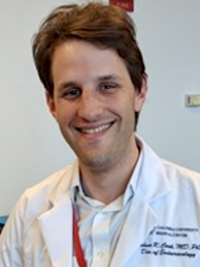
Dr. Joshua Cook
Joshua R. Cook, MD, PhD, never envisioned that a job during undergraduate studies at the University of Pennsylvania would be the start of his career in diabetes research. “I needed to work in college and ended up as a research assistant in a lab thinking I would be washing glassware,” says Dr. Cook, an endocrinologist in the Division of Endocrinology, Diabetes, and Metabolism at NewYork-Presbyterian/
On the strength of his early research, Dr. Cook won a Gates Cambridge Scholarship at the University of Cambridge and earned an MPhil degree in the Severe Insulin Resistance Group at the Institute of Metabolic Science. “I moved from studying the pancreas to adipose tissue but ultimately arrived at my personal passion, which is the liver. I am interested in how the liver works with and against insulin and specifically syndromes of severe insulin resistance,” says Dr. Cook. After Cambridge he went on to earn his MD and PhD at Columbia, followed by a residency in internal medicine through the ABIM Clinician-Scientist Pathway. In 2021, he completed a fellowship in endocrinology at NewYork-Presbyterian/
Now an assistant professor of medicine at Columbia, and a board-certified endocrinologist and internist, Dr. Cook is now establishing his own research group. “I’m particularly interested in insulin resistance and how its associated high insulin levels promote both diabetes and fatty liver disease,” says Dr. Cook. “The hypothesis that I’m testing is that hyperinsulinemia compensating for high glycemic tone promotes the buildup of triglycerides in the livers of people with insulin resistance. This is a potentially controversial idea because it’s unclear if insulin resistance is actually associated with increased or decreased signaling through the lipid-synthetic pathway. My premise is that, for fat, insulin signaling is increased, or at least not decreased like it is for the glucose pathway. So, although that high level of insulin may be just enough to stop the liver from making sugar, it seems that it’s more than enough to drive the liver to produce fat. This essentially creates a difficult trade-off between controlling sugar and controlling fat, and it looks like the liver may be choosing sugar.”
“Non-alcoholic fatty liver disease [NAFLD], also known as metabolic dysfunction-associated fatty liver disease [MAFLD], is now the leading cause of chronic liver disease in the world. It is thought that perhaps a third to one-half of individuals with type 2 diabetes have some degree of excess fat in their liver,” says Dr. Cook. “As the prevalence of diabetes increases this translates to a huge fraction of the population who are at risk of progression to nonalcoholic fatty liver disease or even cirrhosis. My goal is to try to figure out how insulin resistance drives fatty liver disease so that we can intervene early in order to prevent this progression from occurring.”
To test his hypothesis, Dr. Cook will take different approaches to mitigate hyperinsulinemia to determine the impact on de novo lipogenesis in the liver and various other aspects of lipoprotein metabolism. To that end, he has developed a series of three prospective, randomized controlled studies involving both healthy volunteers and those with NAFLD. These studies are designed to explore how careful alteration of insulin levels in the liver differentially impacts on glucose versus lipid metabolism.
This research dovetails with Dr. Cook’s clinical work at NewYork-Presbyterian/
“I’ve been doing diabetes research since I was 17 years old,” adds Dr. Cook. “With superb mentorship combined with my own excitement and curiosity for the field, here I am 19 years later since my first job and still at it. Now that it’s going to be my turn to start being a mentor, I’m going to have to learn the secrets of what made my own mentors great.”



